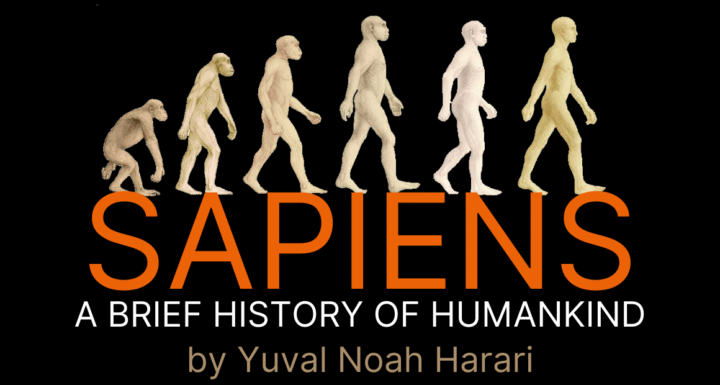Title: Sapiens: A Brief History of Humankind
Author: Yuval Noah Harari
Publisher: Harvill Secker
Genre: History, Anthropology, Philosophy
First Publication: 2011(In Hebrew in Israel ) 2014(In English)
Book Summary: Sapiens: A Brief History of Humankind by Yuval Noah Harari
100,000 years ago, at least six human species inhabited the earth. Today there is just one. Us. Homo sapiens.
How did our species succeed in the battle for dominance? Why did our foraging ancestors come together to create cities and kingdoms? How did we come to believe in gods, nations and human rights; to trust money, books and laws; and to be enslaved by bureaucracy, timetables and consumerism? And what will our world be like in the millennia to come?
In Sapiens, Dr Yuval Noah Harari spans the whole of human history, from the very first humans to walk the earth to the radical – and sometimes devastating – breakthroughs of the Cognitive, Agricultural and Scientific Revolutions. Drawing on insights from biology, anthropology, paleontology and economics, he explores how the currents of history have shaped our human societies, the animals and plants around us, and even our personalities. Have we become happier as history has unfolded? Can we ever free our behaviour from the heritage of our ancestors? And what, if anything, can we do to influence the course of the centuries to come?
Bold, wide-ranging and provocative, Sapiens challenges everything we thought we knew about being human: our thoughts, our actions, our power … and our future.

Book Review: Sapiens: A Brief History of Humankind by Yuval Noah Harari
Sapiens: A Brief History of Humankind is a book by Yuval Noah Harari first published in Hebrew in Israel in 2011, and in English in 2014. The book surveys the history of humankind from the evolution of archaic human species in the Stone Age up to the twenty-first century, focusing on Homo sapiens.
Harari’s work, Sapiens: A Brief History of Humankind, situates its account of human history within a framework provided by the natural sciences, particularly evolutionary biology: he sees biology as setting the limits of possibility for human activity, and sees culture as shaping what happens within those bounds.
The academic discipline of history is the account of cultural change. Harari surveys the history of humankind from the evolution of archaic human species in the Stone Age up to the twenty-first century, focusing on Homo sapiens. He divides the history of Sapiens into four major parts:
- The Cognitive Revolution (c. 70,000 BCE, when Sapiens evolved imagination).
- The Agricultural Revolution (c. 10,000 BCE, the development of agriculture).
- The unification of humankind (the gradual consolidation of human political organisations towards one global empire).
- The Scientific Revolution (c. 1500 CE, the emergence of objective science).
There are countless significant milestones described in Sapiens: A Brief History of Humankind. However, the author repeatedly refers to two events – The Cognitive Revolution where Humankind developed language, abstract thought, created gods, made art and many other things we recognise today as ‘being human’.
“You could never convince a monkey to give you a banana by promising him limitless bananas after death in monkey heaven.”
The other is The Agricultural Revolution, which sounds simple, but its implications are massive. This revolution enables an increasingly smaller percentage of the population to grow food for others in society enabling these people to do other things like make iron, think, bake and all the other duties that make up a developing society. The Cognitive Revolution occurred about 70,000 years ago and the Agricultural Revolution around 12,000 years ago. In between, we were Hunters and Gatherers.
Around 2.5 million years ago humans evolved. Some of our siblings included Homo rudolfensis (East Africa), Homo erectus (East Asia) and Homo neanderthalensis. Homo erectus proved to be the most durable of the human species, lasting 2 million years. Homo sapiens started kicking goals in East Africa around 200,000 years ago. The author makes the assertion “it’s doubtful Homo sapiens will be here in 1,000 years from now; but definitely not in 2 million years-time.”
Homo sapiens managed to drastically disrupt whatever environment they moved into relatively quickly. We were responsible for the extinction of 50% of Megafauna before we invented the wheel, started writing or making iron tools. In fact, our first wave of colonisation was one of the greatest ecological disasters to befall the animal kingdom.
“How do you cause people to believe in an imagined order such as Christianity, democracy or capitalism? First, you never admit that the order is imagined.”
The author tackles the hard to define notion of happiness. He says historians have neglected this indicator over time, to be fair it seems a hard thing to measure. But he believes the increase in complexity of human evolution from the Agricultural Revolution has really resulted in a decrease in human ‘happiness’. I understand what he is saying – seems during our time as hunters and gatherers we would have had spare time to relax after we ‘hunted and gathered’.
The advent of more complex societies seems to have burdened us with tasks, jobs, deadlines, costs, responsibilities. If you look at our lives today, we are surrounded by technology, money responsibilities, change, screens, alarms, traffic, the list is endless. It’s not difficult, in my view, to mount an argument that we humans are perhaps under more pressure, busier, and maybe un-happier than ever before. That’s not to mention the misery we have inflicted on millions of others over the centuries in wars, slavery and various other forms of subjugation.
Generally, if the book has captured the imagination of millions of readers, it is a good thing, especially in the time and age where peoples’ attentions are so incredibly short and distracted by a thousand competing types of information. Any book that covers such big and important concepts as this and can command people’s interest deserves respect. Stimulating discourse or making people rethink their assumptions is a great accomplishment.





